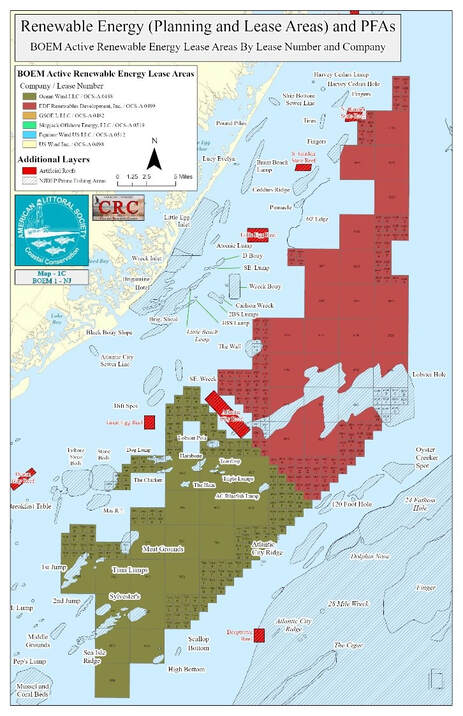 The American Littoral Society recognizes the development of offshore wind as an important component in the fight against climate change by replacing demand for energy production from dirty, polluting fossil fuel sources with clean, renewable energy sources. Development of offshore wind must be responsibly sited, and guided by continuous stakeholder participation. Governor Murphy has taken bold and swift action to make New Jersey a leader in climate mitigation, in large part, by setting robust renewable energy goals for the development of offshore wind farms to power our communities. The Governor’s plans also smartly required development of an Offshore Wind Strategic Plan (OWSP) by the NJ Board of Public Utilities (BPU) as a roadmap to guide New Jersey to meet the statewide goal of 7500 Megawatts of energy coming from offshore wind by 2035. In making New Jersey’s offshore wind goal a reality, wind energy projects will likely span hundreds of thousands of acres on leased ocean bottom off New Jersey’s coast, with the energy they produce cabled back to our shores. In fact, we already know that close to 100 wind turbines and 2 main cable routes will be built within the next couple of years just to meet the state’s first target for producing 1100 Megawatts of wind energy (Ocean Wind LLC). In late summer, the Society submitted detailed comments on the draft Offshore Wind Strategic Plan (OWSP). Our comments stressed that it is impossible to have development of this magnitude in our ocean waters without causing changes to the ecosystem and creating conflicts with existing ocean uses, such as recreational fishing. We advised that the state must only move forward if there is meaningful engagement and collaboration with all those who have a stake in the process – including the recreational fishing community and environmental organizations.
We highlighted the need for an expanded geographic study and planning area that includes our three miles of state waters in order to facilitate improved planning for cable routes and onshore structures. We also pushed for acknowledgement of the need to consider the additional cumulative impacts of the offshore wind goals of New York and other states from Maine to South Carolina that have offshore lease areas because, when considered together, this offshore development will dramatically alter the Atlantic Ocean seascape. Further, we conveyed the importance that New Jersey’s plans for our clean energy future show awareness that the ocean is held in public trust and belongs to us all. Decision-makers must work to minimize the impacts to marine life and traditional ocean uses at every stage of wind development, including the nearshore environment, while pursuing meaningful stakeholder engagement to ensure every voice is given equal opportunity to be heard on every solicitation across the Mid-Atlantic region. In September, after a short review of public comments submitted, the BPU announced approval of the final Offshore Wind Strategic Plan. We were pleased to find that our comments resulted in some strengthening of the final plan, including:
Since the final plan’s adoption, the New Jersey Department of Environmental Protection (NJDEP) has also committed to updating the 2009 Technical Manual for Evaluating Wildlife Impacts of Wind Turbines Requiring Coastal Permits. The Society looks forward to continuing to work with the NJDEP as they establish a schedule for engaging with the Environmental Resources Working Group on issues that correspond with project development, solicitation timelines, and the federal consistency process. As we move forward, offshore wind development in New Jersey and throughout the Mid-Atlantic region will require extensive stakeholder engagement and natural resource considerations at every stage of the process for every windfarm project. The American Littoral Society stands ready to speak for our Ocean every step of the way. Comments are closed.
|
Archives
April 2024
Categories
All
|

